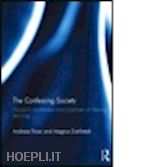"I highly appreciate the quality of Fejes’ and Dahlstedt’s research and writing. They manage to present in a comprehensible way some essential concepts of Foucault that help us to understand better what practices of lifelong learning, in a broad sense, are emerging nowadays in advanced liberal societies. In doing so, they contribute to the renewal of critical thinking in education. They convince me that such renewal is important and necessary… and I think both theoreticians and practitioners of lifelong learning will equally recognize and value this analysis, particularly also, because they present a good mix of theory and practice." -Professor Danny Wildemeersch Today, people are constantly encouraged to verbalise and disclose their "true" inner self to others, whether on TV shows, in newspapers, in family life or together with friends. Such encouragement to disclose the self has proliferated through discourses on lifelong learning through which each citizen is encouraged to become a constant learner. The Confessing Society takes a critical stance towards the modern relentless will to disclose the self and argues that society has become a confessing society. Drawing on Foucault’s later work on confession and governmentality, this book carefully analyses how confession operates within practices of lifelong learning as a way to shape activated and responsible citizens and provides examples of how it might be possible to traverse the confessional truth of the present time. Chapters include: Reflection and Reflective Practices Deliberation and Therapeutic Intervention Lifelong Guidance Medialised Parenting This controversial book is international in its scope and pursues current debates regarding trans-national policy and to research discussions on education, lifelong learning and governance, and it will provoke lively debate amongst educational practitioners, academics, postgraduate and research students in education and lifelong learning in Europe, North America and Australasia.











